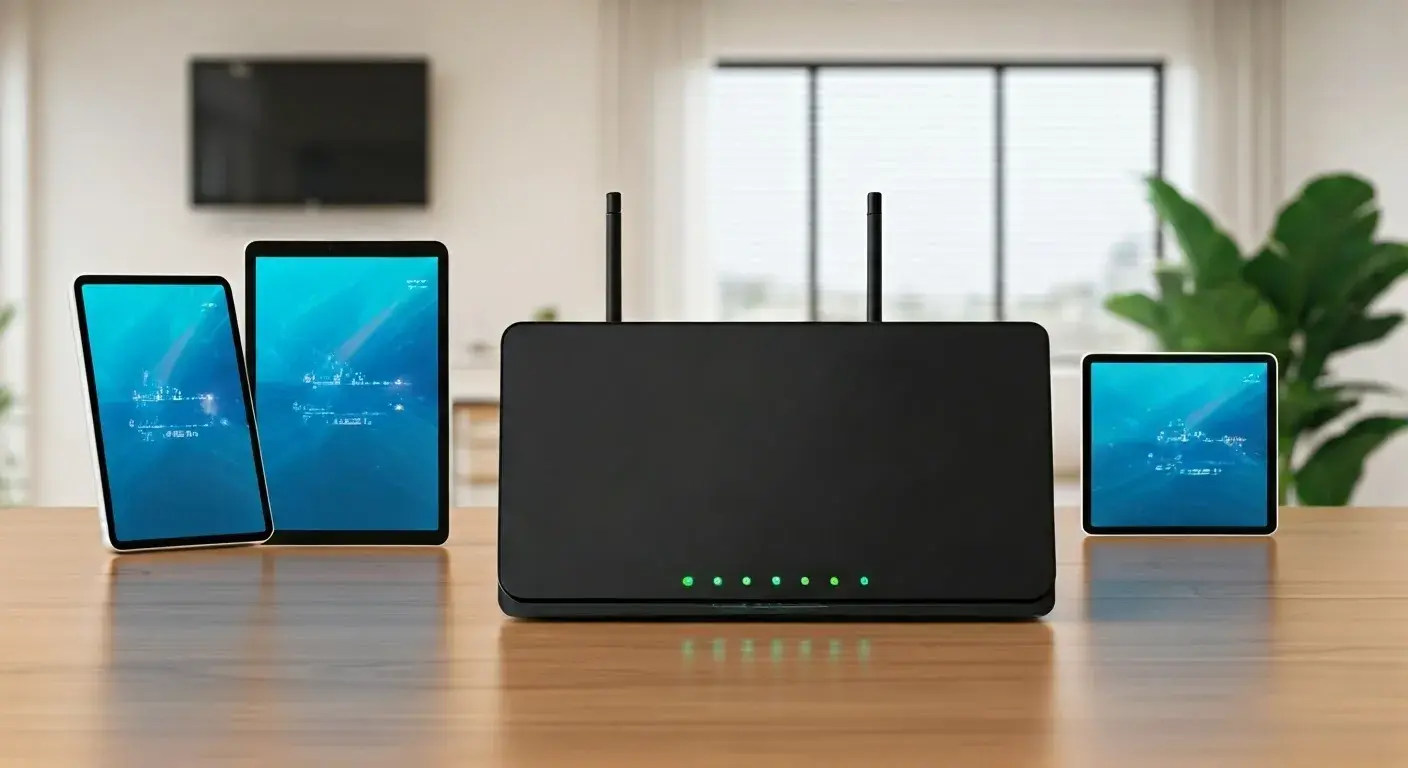T-Mobile Wireless Home Internet: A Reliable Choice for You

For decades, choosing home internet meant one thing: waiting for a technician to drill a hole in your wall and string a cable or fiber line. It meant dealing with monopolistic providers, hidden fees, and annual contracts that felt like handcuffs. But what if there was a better way? A way to get online that was as simple as plugging in a lamp?
Enter T-Mobile Wireless Home Internet. Leveraging the power of its nation-leading 5G network, T-Mobile is challenging the status quo of the internet service provider (ISP) industry. This isn't a mobile hotspot; it's a dedicated, unlimited home internet service designed to replace your traditional cable, DSL, or satellite connection. It promises no contracts, no data caps, and a radically simple setup process.
But in a world conditioned to the (sometimes) rock-solid stability of a physical wire, the burning question remains: Is T-Mobile home internet reliable? Can it truly handle your Zoom calls, 4K streaming, and online gaming? This definitive guide will dive deep into the service, analyzing its performance, pricing, coverage, and real-world usability to help you decide if it's the reliable home internet solution you've been waiting for.
What is T-Mobile Wireless Home Internet?
T-Mobile Wireless Home Internet is a fixed wireless access (FWA) service. In simple terms, it delivers high-speed internet to your home by wirelessly connecting to T-Mobile's extensive cellular network—specifically, its advanced 5G and LTE networks.
Instead of a coaxial cable or a fiber-optic line running to your house, the service uses a dedicated T-Mobile 5G Gateway device. This gateway acts as both a modem (receiving the cellular signal) and a router (broadcasting a Wi-Fi network throughout your home). It's an all-in-one solution that eliminates the need for complex installations and professional technicians.
How Does It Work?
The process is remarkably straightforward:
-
Check Availability: You enter your address on T-Mobile's website to confirm the service is available at your location.
-
Receive the Gateway: T-Mobile ships the gateway device directly to your door.
-
Plug It In: You find a spot in your home with a strong cellular signal (often near a window), plug the gateway into a power outlet, and follow the simple instructions.
-
Get Online: Within minutes, the device connects to the best available T-Mobile tower, and you have a secure Wi-Fi network for all your devices.
This seamless, plug-and-play approach is a cornerstone of its appeal, especially for those in areas underserved by traditional ISPs.
Key Features of T-Mobile Wireless Home Internet
T-Mobile's service is built on a foundation of customer-friendly features that directly address common pain points with traditional internet providers.
-
Unlimited Data: There are no hard data caps or throttling based on usage. You can stream, game, download, and work without anxiously watching your data meter. This is a truly unlimited home internet plan.
-
No Annual Contracts: Your service is month-to-month. You can cancel at any time without facing early termination fees. This low commitment removes the risk of trying the service.
-
Transparent Pricing: The advertised price is what you pay. T-Mobile promises no hidden fees and includes all taxes and costs in your flat monthly rate of $60 (or $50 with eligible mobile phone plans).
-
Simple Self-Installation: As mentioned, the setup is designed for anyone to complete in under 15 minutes. No appointments, no waiting, and no holes in your walls.
Performance and Reliability: The Core Question
This is the section everyone reads. Is T-Mobile home internet reliable? The answer is nuanced: it depends heavily on your location and proximity to a T-Mobile tower, but for millions, it is exceptionally reliable.
T-Mobile Home Internet Speed
T-Mobile advertises typical download speeds between 33-182 Mbps and upload speeds between 6-23 Mbps. However, in many areas with strong Ultra Capacity 5G, users frequently report speeds consistently exceeding 200-300 Mbps download, with some even hitting 400-600 Mbps.
-
Download Speeds: More than sufficient for simultaneous 4K streaming on multiple devices, large file downloads, and HD video conferencing.
-
Upload Speeds: While not matching the symmetric speeds of fiber, the 10-20 Mbps range is solid for uploading large files, live streaming, and stable video calls.
Real-World Performance and Consistency
Reliability isn't just about peak speed; it's about consistency. Unlike satellite internet, latency (the delay in data transmission) is low on 5G, making it suitable for real-time applications like gaming and video calls.
However, because it's a shared cellular network, speeds can fluctuate during times of network congestion (e.g., peak evening hours when everyone is online). While T-Mobile prioritizes its phone customers, for most users, these slowdowns are minor and don't significantly impact the experience. For those in excellent coverage areas, the service is often as stable as cable.
Coverage and Availability: Can You Get It?
The single biggest factor determining your experience with T-Mobile Wireless Home Internet is whether you can get it and how good the signal is at your home.
T-Mobile Home Internet coverage is expanding rapidly, but is not yet universal. It primarily depends on the capacity of local T-Mobile cell towers. The service is available to over 50 million households across the U.S., with a significant focus on suburban and rural areas where traditional broadband options are poor.
-
Urban/Suburban Performance: Typically excellent, often with access to fast Ultra Capacity 5G.
-
Rural Performance: This is where T-Mobile is making huge strides. For many rural internet users, it's a lifeline, offering speeds that dwarf outdated DSL and satellite options. Performance depends on distance to the tower and available spectrum.
You must use the online availability checker on T-Mobile's website for the most accurate answer for your specific address.
T-Mobile Home Internet Equipment: The 5G Gateway
The heart of your service is the T-Mobile 5G Gateway (often the Nokia or Arcadyan model). This sleek, white device is provided at no additional cost as part of your service.
Key Features of the Gateway:
-
Wi-Fi 6 Support: The latest Wi-Fi standard offers faster speeds, better performance with multiple devices, and improved range compared to older Wi-Fi 5 routers.
-
Easy Management: The entire system is managed through the intuitive T-Mobile Internet app, where you can check data usage, run speed tests, restart your gateway, and manage connected devices.
-
Ethernet Ports: It includes two Ethernet ports for wired connections to devices like gaming consoles or desktop PCs, ensuring the most stable possible connection.
*Table: T-Mobile 5G Gateway Specifications*
| Feature | Specification | Benefit |
|---|---|---|
| Wi-Fi Standard | Wi-Fi 6 (802.11ax) | Faster speeds, handles 50+ devices, and has less network congestion |
| Ethernet Ports | Two (2.5Gbps and 1Gbps) | Wired connection for gaming PCs, consoles, and smart TVs |
| Cellular Bands | 5G (n41, n71, n25), 4G LTE | Connects to the strongest available signal for best performance |
| Management | T-Mobile Internet app | Easy setup and control from your smartphone |
T-Mobile Home Internet Pricing & Plans
T-Mobile's pricing structure is famously simple, especially compared to the confusing promotional teaser rates from cable companies.
-
Standalone Price: $60 per month (all taxes and fees included).
-
Bundle Discount: If you have an eligible T-Mobile phone plan (Magenta MAX or Go5G Plus), the price drops to $50 per month ($30 for some older grandfathered plans).
-
Price Lock: T-Mobile guarantees your price will not increase for as long as you keep your service, a stark contrast to the inevitable price hikes from competitors after their promotional periods end.
Table: T-Mobile Internet Pricing vs. Competitors
| Provider | Starting Price | Typical Post-Promo Price | Data Cap | Contract Required? |
|---|---|---|---|---|
| T-Mobile Home Internet | $60 | $60 | None | No |
| Xfinity | ~$35 | ~$90+ | 1.2TB+ | Yes (1-2 years) |
| Spectrum | ~$50 | ~$85+ | None | No (but price hikes) |
| Verizon 5G Home | $50/$70 | $50/$70 | None | No |
Advantages of T-Mobile Wireless Home Internet
-
Revolutionary Easy Setup: The plug-and-play installation is a massive benefit for non-technical users and renters.
-
Exceptional Value: Transparent, all-inclusive pricing with no surprises is a breath of fresh air in the ISP industry.
-
Reliable Speeds in Good Coverage Areas: For locations with a strong 5G signal, it provides consistent, high-speed internet that can easily power a modern household.
-
A Rural Game-Changer: It is often the best wireless broadband option for rural households, finally offering a viable alternative to slow DSL and high-latency satellite.
-
No Contract: The freedom to leave at any time without penalty empowers the consumer.
Limitations of T-Mobile Wireless Home Internet
-
Potential for Speed Fluctuations: As a cellular network, speeds can be impacted by tower congestion and environmental factors.
-
Not (Yet) as Fast as Fiber: It cannot match the multi-gig symmetrical speeds offered by fiber-optic internet.
-
Availability is Still Limited: Despite rapid expansion, it's not available everywhere, and address validation is strict.
-
Placement Matters: Finding the optimal spot in your home for the gateway is crucial for best performance, which can require some experimentation.
T-Mobile vs. Competitors: How Does It Stack Up?
T-Mobile vs. Verizon 5G Home Internet
Verizon is T-Mobile's most direct competitor. Both offer similar 5G home internet services.
-
Speed Tiers: Verizon offers two plans (a slower 5G plan for $50/mo and a faster 5G Plus plan for $70/mo with perks), while T-Mobile has one simple plan. Speeds are highly location-dependent for both.
-
Coverage: T-Mobile currently has a wider 5G internet for home coverage footprint, but Verizon is catching up.
-
Verdict: Check availability for both. Your experience will depend on which carrier has a stronger, less congested network at your address.
T-Mobile vs. Cable (Xfinity, Spectrum)
-
Speed & Latency: Cable can often deliver higher peak speeds (especially download) and may have slightly lower latency, making it theoretically better for hardcore gaming.
-
Pricing & Contracts: Cable providers use promotional pricing that skyrockets after 1-2 years and often require contracts. T-Mobile wins on transparent, flat pricing.
-
Verdict: If you have access to a competitively priced fiber or cable plan and are happy with it, there may be no reason to switch. But for those facing high cable bills, T-Mobile is an excellent cost-saving alternative.
T-Mobile vs. DSL & Satellite
-
DSL: T-Mobile is almost always significantly faster and more reliable than DSL.
-
Satellite (HughesNet, Viasat): T-Mobile obliterates satellite internet in every metric: speed, latency, data caps, and price. There is no comparison for usability.
Who Should Choose T-Mobile Wireless Home Internet?
T-Mobile Wireless Home Internet is an ideal choice for:
-
Households in Rural Areas with limited or poor traditional broadband options.
-
Remote Workers and Students who need a reliable connection for video calls and cloud-based work.
-
Streaming Households that consume large amounts of video on Netflix, YouTube, Hulu, etc.
-
Light-to-Moderate Gamers (latency is typically good, but hardcore competitive gamers may still prefer fiber/cable).
-
City Dwellers looking to escape expensive cable bills and contracts.
-
RV Owners and Renters who move frequently (subject to service address changes).
It might NOT be the best fit for:
-
Ultra-Heavy Data Users who require multi-gigabit symmetrical speeds for tasks like editing 8K video over the network.
-
Esports-Level Competitive Gamers who need the absolute lowest and most consistent latency possible.
-
Households in Areas with Very Weak T-Mobile Signal.
The Future of Wireless Home Internet
The expansion of 5G is relentless. T-Mobile continues to build out its network, adding new towers and upgrading existing ones with more spectrum and capacity. This directly translates to better T-Mobile home internet speed, wider coverage, and improved reliability for its home internet customers.
T-Mobile is playing a pivotal role in bridging the digital divide, bringing high-speed internet to communities that have been neglected by traditional cable and fiber providers for decades. As technology improves with advancements like 5G-Advanced, we can expect wireless home internet to become an even more formidable competitor to wired solutions, potentially offering multi-gigabit speeds to the home without a single wire.
Conclusion: Is It the Right Reliable Choice for You?
So, after this deep dive, we return to the core question: Is T-Mobile Wireless Home Internet a reliable choice?
The evidence strongly suggests that for a massive and growing number of Americans, the answer is a resounding yes. It may not be a one-size-fits-all solution—those with access to cheap, gigabit fiber or the most hardcore gamers might not see a benefit—but it represents a seismic shift in the market.
Its strengths are undeniable: easy setup, transparent pricing, no contracts, and unlimited data. For rural users, it's nothing short of revolutionary. For urban and suburban users, it's a powerful tool to fight back against cable company price hikes.
The final step is simple. The reliability and performance of T-Mobile Wireless Home Internet are hyper-local. The only way to know for sure if it's a reliable choice for you is to check availability at your address. If it's available, the low-risk, contract-free nature makes it an experiment worth trying. You might just discover the reliable, affordable, and simple home internet solution you've been searching for.
Faq
1. What is T-Mobile Wireless Home Internet?
It is a fixed wireless internet service that uses T-Mobile's 5G and LTE cellular networks to provide home internet service, eliminating the need for cables or phone lines.
2. Is T-Mobile home internet reliable?
For most users in areas with good T-Mobile coverage, yes, it is very reliable. It provides consistent speeds suitable for streaming, working, and browsing. Like any wireless service, it can be subject to occasional fluctuations due to network congestion or weather.
3. How fast is T-Mobile 5G home internet?
Typical download speeds range from 33-182 Mbps, but many users in areas with strong 5G see speeds of 200-400 Mbps. Upload speeds are typically between 6-23 Mbps.
4. Does T-Mobile home internet include unlimited data?
Yes. It is a truly unlimited data plan with no data caps or throttling based on usage.
5. How much does T-Mobile home internet cost per month?
The standard price is $60 per month, all taxes and fees included. If you have an eligible T-Mobile mobile plan, you can get it for $50 per month.
6. Is T-Mobile's internet good for streaming and gaming?
Streaming: Excellent for streaming HD and 4K video on multiple devices. Gaming: Good for light-to-moderate gaming. Latency is low enough for a smooth experience, though serious competitive gamers might prefer the ultra-low latency of a fiber connection.
7. Can I use my own router with T-Mobile Home Internet?
Yes. The T-Mobile gateway can be put into "IP Passthrough" or "Bridge" mode, allowing you to connect and use your own high-end router for more advanced Wi-Fi management.
8. Does T-Mobile home internet work in rural areas?
Yes, it is one of the best rural internet options available today. Its availability and performance in rural areas are a key focus for T-Mobile. You must check your specific address for availability.
9. How does T-Mobile compare to Verizon home internet?
Both are very similar. The better choice depends solely on which carrier has a stronger, less congested 5G signal at your specific location. Check availability for both services.
10. What equipment do I need for T-Mobile home internet?
You only need the T-Mobile 5G Gateway router that the company provides. There is no additional equipment to buy.
11. Does T-Mobile's internet require a contract?
No. There are no annual contracts. The service is month-to-month.
12. Will T-Mobile home internet replace cable and fiber?
For many millions of households, it already has. While it may not replace the absolute peak performance of fiber for power users, it is a more than capable replacement for cable and DSL, offering a compelling mix of performance, price, and simplicity.





